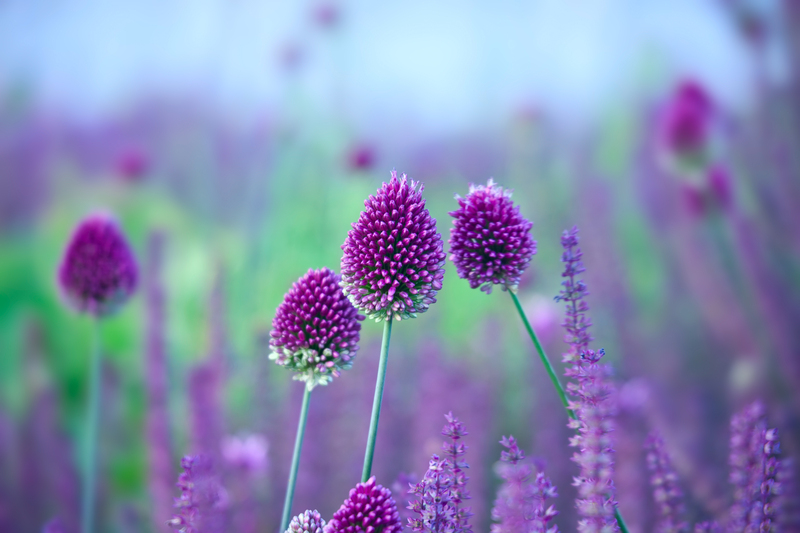Gain Control over Weeds with These 3 Insightful Tips
Posted on 18/06/2025
Gain Control over Weeds with These 3 Insightful Tips
Struggling to manage weeds in your garden or landscape? You're not alone. Unwanted plants, or weeds, compete fiercely with your treasured flowers, vegetables, and even lawns. Their fast growth and resilience make them tough adversaries. Fortunately, with the right strategies, you can master weed control and reclaim your green space. This comprehensive guide uncovers effective methods to help you gain control over weeds, promoting a healthy and beautiful landscape.
Why Weeds Are a Persistent Problem
Weeds are nature's survivors. They emerge in almost any condition, reproduce rapidly, and quickly outcompete cultivated plants for water, nutrients, and sunlight. Most gardeners face weeds such as dandelions, crabgrass, chickweed, and bindweed alongside any vegetable plot, lawn, or flowerbed.
Many factors contribute to the persistence and spread of weeds:
- Extensive Seed Production: Weeds like dandelions can produce thousands of seeds per plant.
- Efficient Dispersal: Wind, wildlife, pets, and people can all spread weed seeds far and wide.
- Adaptive Growth: Some weeds thrive in poor soils and harsh climates where other plants struggle.
- Hidden Roots and Shoots: Many weed species regenerate from even tiny root fragments.
To truly control weeds and keep your garden thriving, it's essential to use a comprehensive approach rather than relying on a single weed-removal tactic. Let's dive into three insightful tips for weed management that can change your gardening game.

Tip 1: Implement Mulching for Natural Weed Suppression
Understanding Mulch and Its Role in Weed Control
Mulch is much more than a decorative layer for your garden beds. This material--ranging from organic matter like wood chips and straw to inorganic options such as stones and plastic--acts as a powerful barrier against weed growth. By blocking sunlight, mulch inhibits weed seed germination and helps maintain moisture and temperature balance in your soil.
How Mulching Helps You Gain Control Over Garden Weeds
Applying mulch is among the most effective and sustainable strategies for gaining control over weeds. Here's how mulch offers a multi-pronged attack:
- Suppresses Weed Germination: Without light, most weed seeds fail to sprout.
- Maintains Soil Moisture: Less open soil means less space for weeds to colonize.
- Improves Soil Health: Organic mulches decompose, feeding beneficial soil microbes that outcompete weeds.
- Reduces Temperature Fluctuations: Stable temperatures make it less likely for opportunistic weeds to invade disturbed spaces.
Types of Mulch for Effective Weed Management
Is one mulch better than another? While the best choice can vary, the following options are especially effective:
- Wood chips or Bark: Best for perennial beds, trees, and shrubs. Lasts long and looks attractive.
- Straw: Ideal for vegetable gardens--make sure it's seed-free to prevent introducing new weed species.
- Compost: Adds nutrients as it suppresses weeds. Apply in a thick, dense layer.
- Cardboard or Newspaper: Biodegradable layers beneath other mulches enhance weed-blocking power, particularly in new garden beds.
- Gravel or Stones: Excellent for pathways and succulent gardens. These don't break down but provide a long-term barrier.
Best Practices for Mulching
- Apply Generously: Use at least 2-4 inches of mulch to block sunlight effectively.
- Leave Space Around Stems/Trunks: Avoid piling mulch against plant bases to prevent rot and disease.
- Refill Regularly: Organic mulch decomposes over time--top up each season to maintain coverage.
- Remove Existing Weeds: Ensure you weed thoroughly before mulching to avoid trapping live weeds underneath.
Proper mulching drastically reduces the labor of weed pulling and creates healthier, more productive garden beds.
Tip 2: Use Smart Planting Strategies to Outcompete Weeds
The Power of Dense Planting
Nature abhors a vacuum, and so do weeds. Sparse planting leaves open spaces--and open invitations--for unwanted plants to take root. By carefully planning and densely planting your beds, you can dramatically reduce weed invasion.
- Choose Fast-Spreading Groundcovers: Hardy groundcovers like creeping thyme, ajuga, or vinca form living mulches, blocking sunlight and smothering weed seedlings.
- Practice Succession Planting: Replace harvested crops quickly in the vegetable garden to limit bare soil, a key weed entry point.
- Cluster Plants in Groups: Planting in tight clusters or drifts leaves less room for weeds to gain a foothold.
- Layer Tall and Short Plants: Tiers of vegetation help shade your soil from above, starving weeds of the sunlight they crave.
Companion Planting to Gain Control Over Weeds
Companion plants can act as weed deterrents while bringing other garden benefits. Try these proven combinations:
- Marigold and vegetables: Marigold roots exclude soil-borne pests and their shade helps suppress weeds in vegetable beds.
- Squash with corn and beans ("Three Sisters"): Large squash leaves screen the soil, preventing weeds from emerging.
- Herb borders: Aromatic herbs (like thyme or oregano) used as border plants can form thick mats that guard the garden edge.
Choosing the Right Plants for Effective Weed Competition
Thick foliage and rapid growth are key characteristics to look for when selecting plants. Consider these recommended species:
- Sedges and ornamental grasses: High-density root systems leave weeds little chance.
- Perennial flowering plants: Species like coneflowers and black-eyed Susans grow back reliably each year, filling space and crowding out annual weeds.
- Legumes: Peas, beans, and clovers both enrich soil and form dense mats.
_Strategic planting is a proactive step in garden weed management, harnessing nature's own methods to keep weed growth in check._
Tip 3: Master Mechanical and Manual Weed Removal Techniques
Understanding the Importance of Timely Weed Removal
No matter how diligent you are with mulches and planting design, a few weeds will still try to sneak in. Removing weeds promptly--before they flower or set seed--is vital for long-term weed management.
Physical or mechanical weed control remains the first line of defense for persistent, hard-to-kill, or invasive weeds.Effective Weeding Methods for Every Gardener
- Hand Pulling: Best for small numbers of weeds, particularly annuals and young plants. Moisten soils to make root removal easier.
- Hoeing: Use a sharp hoe to slice off weeds at or below the soil surface. Hoe regularly to prevent weed roots from getting established.
- Weed Extractors and Forks: Useful for tap-rooted weeds (like dandelions) or perennial invaders such as dock or thistle.
- Flame Weeding: Effective for driveways, sidewalks, and gravel paths. Flame weeders use intense heat to wilt and kill both the tops and roots of small weeds.
- Cultivators and Tillers: Useful for larger beds, but should be used with care. Over-tilling can disrupt soil health and bring dormant weed seeds to the surface.
Timing and Persistence: The Secret Ingredient
- Weed When Small: Young weeds are easier to pull, less likely to have developed strong roots, and haven't seeded yet.
- After Rain or Watering: Moist soil allows roots to slip out whole with less breakage.
- Schedule Regular Sessions: Weekly or bi-weekly inspections prevent sudden outbreaks.
- Dispose Properly: Bag up and remove mature weeds to prevent seeds from dispersing on-site.
How to Prevent Weeds From Returning After Removal
After manual or mechanical removal, protect cleared soils using the methods we've covered: mulching and dense planting. Quick covering prevents air-borne seeds from colonizing exposed spots!
Persistence in weed removal is rewarded with progress. Each year, as your control methods improve, you'll see fewer and fewer weeds reappearing in your garden, lawn, or landscape.
Bonus Tips: Integrated Pest and Weed Management for Long-Term Success
Successful weed control is rarely about one quick fix--it's about blending many techniques and sticking with them for the long haul. Here are some extra ideas to help gain control over weeds even faster:
- Sow Cover Crops in Off-Season: Planting rye, clover, or buckwheat on unused beds smothers weeds and boosts soil health.
- Keep Edges Tidy: Frequently weed borders, paths, and fences to prevent infestation from "creeping in" from the edges.
- Don't Overwater: Excessive irrigation benefits weeds as much as crops. Water only where and when it's needed.
- Watch for Weedy Invaders: Inspect new plants or soil amendments for hitchhiking weed seeds or root fragments.
- Utilize Landscape Fabric with Caution: Inorganic weed barriers can work well but may limit soil health if overused. Use beneath decorative gravel or in high-weed-pressure sites.

The Takeaway: A Holistic Approach to Weed Control
Gaining control over weeds is achievable with informed, persistent strategies. By combining mulching, competitive planting, and regular, thorough weed removal, you're building a lasting defense against unwanted plants.
Turn weed management from a dreaded chore into an empowering part of your gardening routine. Your reward? A lush, productive, and beautiful outdoor space where your chosen plants--not weeds--take center stage.
Ready to transform your garden? Start today with these three insightful tips and experience the benefits of effective weed control all season long!
FAQs on Gaining Control Over Weeds
-
What is the most effective way to permanently kill weeds?
No single method is 100% permanent, but combining heavy mulch, dense planting, and regular weed removal is the most effective long-term solution. -
How can I control weeds without using chemicals?
Natural methods include mulching, manual removal, flame weeding, dense planting, and cover crops. These approaches protect pollinators and soil health. -
How often should I weed my garden?
Inspect your garden every 7-14 days during the growing season and after storms or disturbance. Frequent attention prevents large infestations. -
Does mulch work on its own or do I need other methods?
Mulch is tremendously effective, but works best when combined with clearing existing weeds and filling open spaces with dense planting. -
Which is better--organic or inorganic mulch?
Organic mulches improve soil health as they decompose. Inorganic mulches (like gravel) offer longer-lasting, low-maintenance options. Consider your garden's unique needs.
Conclusion: Take Action Today for a Weed-Free Tomorrow
Applying these three insights--mulching, smart planting, and timely manual removal--will help you gain lasting control over weeds. Consistency and patience are key: monitor your garden regularly, make adjustments as needed, and enjoy the results of your dedication. With these strategies, your lawn or garden will stay lush, productive, and delightfully weed-free.
Latest Posts
Create a Soul-Nourishing Herb Garden Oasis at Home
Mastering Wind Control for a Peaceful Garden Destination
Sustainable living through vertical gardening
Elevate Garden Spaces with Artistic and Functional Seating Ideas

